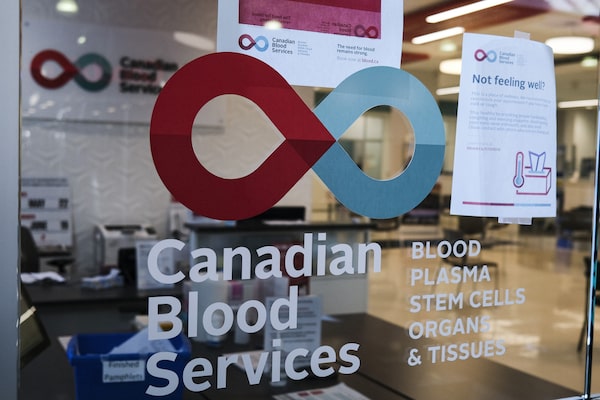
A blood donor clinic pictured at a shopping mall in Calgary, Alta., on March 27, 2020.Jeff McIntosh/The Canadian Press
Canadian Blood Services has for the first time completed an agreement with a private, for-profit company to collect blood plasma from the country’s donors – a move that the head of the agency says will open the door to paid plasma collection in Ontario and B.C., where the practice is currently banned.
CBS announced Wednesday it had signed a deal with Grifols, an international pharmaceutical firm headquartered in Spain, to partner on collecting blood plasma from Canadian donors for use in manufacturing medication for the country’s patients.
CBS said the initial term of the agreement was 15 years, with possible extensions. The agency, which oversees blood collection in all provinces except Quebec, declined to disclose financial terms of the deal because of commercial confidentiality.
The deal is part of CBS’s strategy to boost its domestic collection of plasma. The agency currently collects about 15 per cent of its needs in Canada through voluntary donations and buys the rest from the global market, where donors are often paid.
CBS has been constructing additional collection centres to get to 25-per-cent self-sufficiency, but the agency says the deal with Grifols will allow it to source more than 50 per cent of its plasma needs from within Canada.
The business model of private firms relies on paying donors for their plasma. Paid plasma collection is banned in Ontario and British Columbia, though the laws in both provinces contain an exemption for CBS or its agents.
(The practice is also banned in Quebec and the provincial blood agency has said it has no plans to change or work around that.)
Graham Sher, the chief executive officer of CBS, said it is his understanding that the deal with Grifols will allow the company to circumvent the bans in Ontario and B.C.
“It is our assessment that the transaction that we’ve negotiated with Grifols is in compliance with the agent exemption granted under those two pieces of legislation,” Dr. Sher said.
When asked why CBS granted a de-facto monopoly on paid plasma collection in the two provinces, Dr. Sher said he was not at liberty to explain that decision because of the commercial sensitivities in how the agency evaluated companies’ bids for the contract.
Grifols, which did not respond to a request for comment on Wednesday, has identified Canada as a growth market in past news releases and investor documents. The company bought a manufacturing facility in Montreal in 2020 and a donation centre in Winnipeg in 2021.
Dr. Sher indicated Grifols’s recent investments in Canada, along with the fact that CBS has purchased the company’s plasma products for many years, was a major factor in why it was chosen for this contract.
“They are familiar with the Canadian market and we are familiar with them,” he said.
Barzin Bahardoust, chief executive officer of Canadian Plasma Resources, the largest chain of private plasma collectors in Canada, said CBS’s decision to work with private companies is a step in the right direction for ensuring better domestic supply of plasma.
However, he said he was concerned by the agency’s decision to allow one company exclusive rights to collecting paid plasma in some major markets.
“Having a more competitive environment would lead to better quality and better value for patients,” Mr. Bahardoust said. “I don’t think they justified why they only wanted to have one operator.”
The deal marks a major change in direction for CBS. The agency had long warned that allowing private plasma collectors to operate in Canada would negatively affect its own voluntary collection efforts.
Dr. Sher said the details of the deal with Grifols has alleviated those concerns. He said the company will only be allowed to operate in markets where CBS is not and will have to submit a list of proposed collection sites to the agency for approval before they are to be built.
“Some of the concerns that have been raised in the past, both by ourselves and by others, is that the unbridled expansion of the commercial plasma sector, without controls, is the issue that we would be concerned about,” Dr. Sher said. “The significant outcome of this transaction is that those controls are absolutely built into the transaction.”
Health Canada and CBS have said that research shows plasma from paid donors is just as safe as plasma from unpaid donors.
Wednesday’s announcement drew mixed reaction from health groups. The Canadian Health Coalition, a non-profit that advocates for public health and receives union funding, said CBS has eroded public trust in the agency by carrying out discussions with for-profit companies in private.
“There has been no public debate allowed concerning the dangers of commercial collection of plasma on this massive scale,” said Michèle Brill-Edwards, a physician and member of the coalition’s board.
BloodWatch, a group that advocates for voluntary blood donation, has called for the resignation of Mr. Sher and CBS’s board of directors.
Other patient groups have welcomed the news as a way to build a new, reliable source of donations.
“We have long advocated for an approach that includes working with the commercial sector to ensure Canadian patients have access to life-saving plasma-derived medicinal products when needed,” Jennifer van Gennip, executive director of the Network of Rare Blood Disorder Organizations, said in a statement. The group receives some of its funding from pharmaceutical companies.
Our Morning Update and Evening Update newsletters are written by Globe editors, giving you a concise summary of the day’s most important headlines. Sign up today.